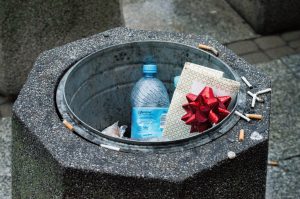The saying goes that one man’s trash is the next man’s treasure, basically meaning that we all place different value on material goods. But in the case of a South Florida defense attorney, it’s more likely to refer to the fact that you’re literal trash may be the treasure of a prosecutor seeking to put you behind bars. 
With the proliferation of DNA evidence as key to prosecutions, digging through a suspect’s trash has become a growing source of evidence for many state and federal attorneys. Generally speaking, unlike the contents of your home or even a DNA test of your own bodily fluids, once your trash is carried to the garbage for disposal, it becomes fair game for law enforcement authorities to access – without a warrant. As established in the 1978 federal case of U.S. v. Crowell by the U.S. Court of Appeals for the Fourth Circuit, you have no reasonable expectation of privacy per the Fourth Amendment for the garbage you place outside for collection. In fact, so-called “trash pulls” have become a veritable treasure trove for some narcotics units in Florida. In some cases, it even becomes the basis for securing a search warrant on your actual home.
However, it’s not unheard of for police agencies to get too hasty in their quest to gather evidence sufficient for probable cause to secure a warrant to fail to obtain adequate evidence prior to requesting that warrant. For example, simply finding cocaine residue or marijuana seeds in the bottom of a trash bin may in fact be insufficient, thus leading to an affidavit that is deficient for the warrant that is ultimately signed. Based on the fruit of the poisonous tree doctrine, that could mean everything that is found thereafter is inadmissible (if your criminal defense lawyer files a motion to suppress) – and may result in an entire case being tossed.
To Whom Does the Trash Belong?
So once the trash is placed outside for collection, you forfeit any objectively reasonable right to assert privacy. That assumes it was left “ready accessible to the public,” which is determined on a case-by-case basis, as noted in U.S. Court of Appeals for the 11th Circuit’s case in U.S. v. Segura-Baltazar. (That case hinged on whether the trash bag was actually left out for collection or whether it was still within the private property bounds of the suspect’s private property.) In some cases, courts have found rubbish to have been “reasonably abandoned,” even if it’s still technically on your property.
“Treasure” in Trash as Basis for Probable Cause to Secure Home Search Warrant
Florida courts have held that in general – as it pertains specifically to narcotics cases – a single trash pull garnering evidence of drug use is not sufficient to establish probable cause for a home search warrant. South Florida defense attorneys saw this in the 1999 Florida appellate case of Gessell v. State. In that case, law enforcement conducting a single trash search found marijuana residue in plastic baggies. There was no indication of other evidence that might indicate the sale of unlawful drugs, such as scales for weighing or logs of people owing money.
A single trash pull that reveals evidence of drug trafficking, however, (for example, a kilo of cocaine) would likely be a different story.
Another case frequently cited in Florida is a decision in 1998 by the Fla. 4th DCA in Raulerson v. State, wherein multiple trash bags were searched, each with evidence of drug use (i.e., partially-smoked joints, stems, seeds, etc.). Even though there were multiple bags, the appeals panel reversed the trial court’s denial of motion to suppress, finding no other sufficient facts that might indicate a probability illegal substances would be found inside the residence.
If police search your trash and find evidence of drug use on which to base a search of home and probable cause on that basis to arrest you, do not agree to an interview or answer questions before talking to an experienced South Florida defense attorney.
Call Fort Lauderdale Criminal Defense Attorney Richard Ansara at (954) 761-4011. Serving Broward, Miami-Dade and Palm Beach counties.
Additional Resources:
How police uncovered prostitution at Florida spa Kraft allegedly visited, Feb. 22, 2019, Atlanta Journal-Constitution
More Blog Entries:
Florida Medical Marijuana: Does it Impact Vehicle “Sniff-and-Search”? Feb. 22, 2019, South Florida Defense Attorney Blog
 Fort Lauderdale Criminal Attorney Blog
Fort Lauderdale Criminal Attorney Blog


